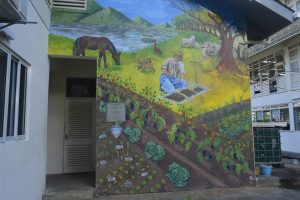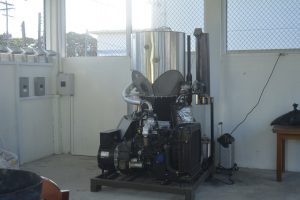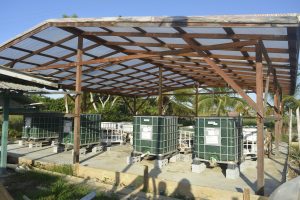While many are in high spirits that the emerging oil sector will significantly boost the country’s economy and improve the standard of living for Guyanese, others are hoping that agriculture will not be put on the back-burner.
Among those is Dr. Elroy Charles, Head of Department (HoD) of the Faculty of Agriculture and Forestry at the University of Guyana, Turkeyen Campus.
He said that, at the university level, greater efforts will be made to keep the agriculture sector relevant.
“Agriculture has been the backbone of Guyana’s economy all the time until we found oil. It has always been one of the main contributors to our Gross Domestic Product (GDP). The main pillar on which Guyana’s economy is geared because of the fact that it also employs a large sector of our people. Rice, sugar and fishery always attract lots of employment,” Dr. Charles said.
He said some years ago, agriculture became second when mining took over and now with the emergence of oil, this is the time to ensure that agriculture still remains at least in the top three of economic activities.
He said there was such a wide scope in agriculture, that, if developed properly, it could remain as a top producing and incoming earning sector.

“One area we should definitely develop is agro-processing. More work has to be done to improve the standards of our products to reach the international market. The Guyana School of Agriculture did a lot of training and the government facilitated many training [programmes] through GSA on agro-processing. But we need to work on food safety, we need labs to ensure that we do the quality testing and ensuring that we reach the standards. That’s not in place at the present moment, so as a result of that, a lot of those agro-processing is done in small scale. But there’s a lot of scope there,” Dr. Charles said.
“Once we have our labs and the Food Safety Bill in place, then we hope that we can move in that direction of agro-processing so that can become a major contributor besides the production. In addition, we have recently added coconut as another main crop and so coconut actually is becoming the number three crop in Guyana for its production. We produce nuts, water, and oil, but it has to be shipped to Trinidad or Dominican Republic to produce these processed products because we have issues with labs, testing for microbial, and food safety issues. We have the potential to produce agro-processed products with better taste and more nutritious value, but we have to up our game where packaging is concerned so that we can compete with the other territories that are sending things to Guyana,” he added.
BREAD BASKET OF THE CARIBBEAN

which is used for electricity and the production
of bio char
In April of 2019, Food and Agriculture Organisation (FAO), Assistant Director General, Dr. Julio Berdegue, had said Guyana can be the solution to the Caribbean’s food import problem, but only if the country realises its “production potential”.
He said the Caribbean faced an enormous problem of a food import bill which was growing every year for the past 30-35 years. Right now, the Caribbean was spending US $4.5B each year to buy food that can be grown in the sub-region.
“Guyana is a fundamental part of the solution to this problem. Few other countries in the Caribbean have the production potential of Guyana,” he said.
In this regard, Dr. Charles said that indeed Guyana had the advantage over other Caribbean countries, and that was due to the fact that Guyana has fresh water system and large swaths of areas that can be cultivated for agriculture.
“We have large pool of fresh water for agri production, and we have the space. Many Caribbean countries don’t have that. Volcanic Caribbean territories have very nutrient rich soil, but the space for production is lacking. But as much as we have land space, most of those are nutrient-poor soils. Large areas of Guyana have white and brown sand, sand has little to no nutrients. Our loamy soils are in patches, and the clay soils that we have are the ones we are doing the sugar and rice on. They are located on the coastal belt, and at certain times when there is flooding, it can impact our own production,” he said.
WHAT THE UNIVERSITY IS DOING
Given the aforementioned, HoD Charles said that was where he believed the university comes into play.
“How do we then utilise these soils in order to expand agri production. This is where I think the university comes into play for training, for extension service and for research. We hope that students leaving our premises have competencies in order to be able to utilise any landmass to grow any crop that you want. The whole idea that crops are grown on arable soils only is a thing of the past,” he said.
The doctor explained the different branches of agriculture which utilise different media of production, such as hydroponics and aquaponics.

“The reality is that the university is forced to go into an area where it seeks to train our graduates in order to utilise the resources that are available to us, so that we can be able to grow crops and compete internationally. And one of the things this university, especially the Faculty of Agriculture is pushing, is bio char. Bio char is a sort of soil organic amendment. It basically is anaerobic burning of biomass material, which is wood, wood shaving, bagasse, grass and so on. It helps the soil to retain the nutrients instead of being leached and washed out. That activated carbon from the bio char enables the soil to retain nutrients, and even moisture; it enables the soil to have a better property, to allow for plant growth,” Dr. Charles explained.
That, he said, was already tested in the university’s research work, and he believed that it can be the solution to increase local production.
“I’m saying for us to utilise that large swath of white sand areas, the opportunity is that we have to use organic amendment for those soils. Bio char offers a better opportunity for utilisation and it lasts for years, maintaining nutrients to grow anything you want. And this is the direction in which the faculty of agriculture has been pushing for the last five years. Now we have a kiln and a gasifier. The gasifier is used for electricity but the byproduct it produces is bio char, and that basically will be used. And we are pushing for research work to be done in our sandy areas on our sandy soils, so that we can show the benefit of such use,” he further noted.
Additionally, he said another organic amendment the university had tested was vermicomposting. Vermicomposting, he explained, was the use of organic matter and earthworm and transforming organic matter into humus.
There were many solutions to the defects in Guyana’s agri sector, he noted, and the university was ensuring that the students were equipped with the knowledge to transform the sector.
However, Dr. Charles said what would be best was if the graduates could be offered low interest loans to put to work what they have learnt at the university.
Because of the many different branches of agriculture and the wide potential it has, he said that it would be impossible to cover everything in one conversation session. However, it can be concluded that potential existed for Guyana to be rated highly for its agriculture production.
“Agriculture career is wide. There are so many different people involved to make it work and we have seen a slight increase in the population of students coming into agriculture. Our classes are filled. In essence what we want is larger space and labs at our university. The demand will be greater for employees because different agencies are coming into the picture so there is greater demand for skillset, and we have the potential to compete,” he posited.




